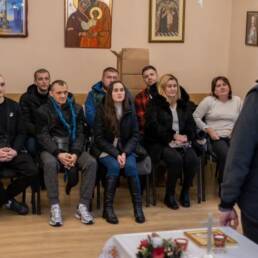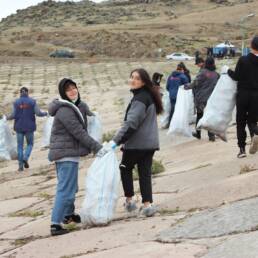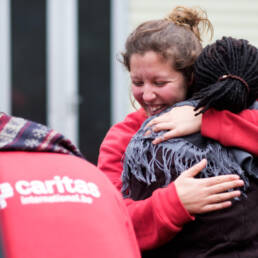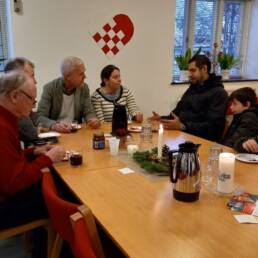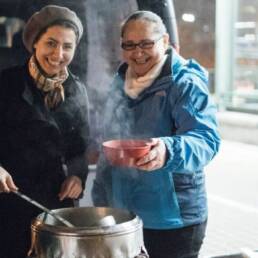Author
József Hideg
Settlement Coordinator Téseny
Caritas Hungary
“What kind of world do we want to leave to those who come after us, to children who are now growing up?” This question is raised by Pope Francis in his encyclical Laudato Si’ published five years ago.
Inspired by the encyclical, Caritas Hungary is now engaged in long-term Laudato Si’ based model-programmes in the poorest rural areas of Southwest Hungary. These programmes are comprehensively addressing environmental issues in Kisszentmárton and Téseny: two tiny villages with some two hundred inhabitants each, severely hit by ecological degradation of many types.
Caritas Hungary started its model-programme some 18 months ago by thoroughly analysing ecology-related damages to the two villages. In strategic cooperation with Malteser Hungary, an in-depth “Diagnosis” was generated which set out a range of necessary interventions over a period of at least five consecutive years. Our motto for planned interventions is “changing direction” as suggested by Laudato Si’. By turning change into reality Caritas Hungary is now on its way to get irrevocably and deeply involved in “the urgent challenge to protect our common home” working closely with the locals of these villages on a daily basis. Amidst adverse effects of climate change in Kisszentmárton and Téseny our daily work is fed by hope as per Laudato Si’: “men and women are still capable of intervening positively” and “Yet all is not lost. Human beings, while capable of the worst, are also capable of rising above themselves, choosing again what is good”.
It is of utmost importance to us that all Caritas Hungary colleagues involved in our local efforts “enter into dialogue with all people about our common home”. Taking this recommendation of Laudato Si’ seriously, we added results of more than fifty personal interviews with locals to our “diagnosis” to arrive at a fine-tuned version of planned actions. Action plans were then converted into a comprehensive revitalisation and regeneration ecology programme widely involving the local population. This programme was named after Saint Isidore the Farm Labourer who is venerated as the patron saint of farmers, peasants, day labourers and agriculture in general.
Let us now take you through some details of our Saint Isidore Programme adhering to the structure of Laudato Si’:
“Available water is constantly diminishing”:
Kisszentmárton is increasingly and very badly hit by agri-desertification. The main reason of which being the inappropriate control of the nearby river Drava. Dams erected and loss of anabranches prevent the river from annually covering its natural floodplains which were largely converted into arable land. The regulation of Drava resulted in a speed-up of water run-off therefore the river bed is becoming deeper. Deepening river beds (“river incision”) always cause a drain-down of groundwater levels. As a consequence of this, hundreds-of-years-old water wells used by households to water their vegetable gardens are up to 90% dried out by now.

The effect is devastating: vegetables die from the low water content of soils without a hope for the locals to use wells to water their plants. On top of that, traditional local species of fruit trees are also dying. This does not just mean less fruit for the inhabitants but it also fundamentally endangers bio-diversity by the adverse change of losing the ancient genetic diversity of old growth fruit trees. Téseny is located somewhat further away from the river Drava and is therefore not effected by the adverse change of riverbed incision, however the village completely lacks natural surface water flows such as creeks and ponds fed by creeks. Sadly, this village is also losing groundwater at an astonishing pace. With the appearance of weeks long deadly summer heatwaves in South-Hungary, the local population is ending up with a Kisszentmárton-scenario: “gardens dry, old trees die”.
In the framework of its Saint Isidore the Farm Labourer Programme, Caritas Hungary is now delivering a solution to both settlements: we provide, free-of-charge, the households engaged in gardening with one-cubic-meter plastic containers to retain water. Rainwater is collected from the roofs of the houses and individual containers can be filled approximately ten times during the summer. This volume is sufficient to water vegetable gardens during summer heatwaves and vegetables can, again, be grown by people without fear of killing droughts or from entirely losing their plants. It is very important to recall that the absence of water can potentially bring gardening activities to a total halt in both villages and that would leave the local people facing sky-rocketing food prices in Hungary due to COVID-19 and the tendency of less crop harvested due to climate change.
Protection of bio-diversity:
“Each year sees the disappearance of thousands of plant and animal species which we will never know, which our children will never see, because they have been lost for ever” – a phenomenon calling for smart interventions and a focal point of Laudato Si’. Following the multiple inspection of vegetable gardens cultivated by locals and assessing the general condition of rural areas surrounding both villages it became evident to Caritas Hungary that bio-diversity in Kisszentmárton and Téseny has suffered damage to an almost catastrophic extent.
One of the main phenomena is that local species of vegetables almost completely disappeared from household gardening. Seeds of these species can be sown multiple times even for decades when and if seeds are retained by gardeners every year. During the last decades seed prices in Hungary grew by hundreds of percent while non-salvable hybrid seeds rule the shelves. Cost of annually buying seeds simply cannot be covered anymore by a significant proportion of local households. Inhabitants started to give up gardening due to rising seed costs and lack of water as described above. Caritas Hungary started to cooperate with local experts to work out a solution as part of its Saint Isidore Programme. Caritas Hungary has traditionally run seed provision programmes across Hungary but in these villages a new experiment is launched now: we are restructuring the composition of Caritas’ seed bags: the proportion of hybrid seeds is decreased year by year during the next 3-5 years while salvable seeds are gradually re-introduced. This move will be supported by trainings for locals to strengthen the fading knowledge of regularly saving seeds.
Another finding of our “diagnosis” was that none of these villages have a local expert of grafting anymore. Therefore the number of ancient versions of climate-resilient species of fruit trees is on the decline, especially in Téseny. As local gardeners lost their financial strength during the last three decades, they are not replacing their dried-out ancient fruit trees anymore or when doing so, replacements are based on commercial species. This raises questions about the trees’ stability, volatility of annual fruit volumes and yield stability. To retain appropriate traditional fruit-volumes and quality Caritas Hungary provided 552 fruit trees of ancient local species to fruit-gardeners of Téseny and Kisszentmárton. In our Saint Isidore the Farm Labourer Programme we forecast a need of some 600 more such fruit trees which will be planted in autumn 2020.

Climate change:
As per Laudato Si’ “Climate change is a global problem with grave implications: environmental, social, economic, political and for the distribution of goods. It represents one of the principal challenges facing humanity in our day”.
Both Téseny and Kisszentmárton are already facing rough challenges from global climate change while local populations with weak financial means have only a poor and inadequate adaptation and mitigation ability. First of all summer heatwaves generate prime risks to people’s health: absence of proper insulation of houses expose inhabitants to hardly tolerable inner temperatures of buildings.
The Saint Izidore Programme is undertaking a number of preventive and mitigating measures. Our construction engineers one by one assess the heat-adaptation ability of houses. In cases of houses with low thermal resistivity, Caritas Hungary is providing basic insulation material to the owners. Upon receipt of such materials owners form local construction brigades consisting of friends and relatives. It is these brigades which carry out the actual work of insulating houses. This way, the very high costs of hiring construction professionals is entirely cut out.
To further fight climate change related heat-waves, our Programme employs a threefold route of additional interventions. Firstly we combine our gardening revitalisation measures with the creation of green facades: walls hit by solar exposure are covered with grape vines. Secondly by allocating soft fruits, crane fruits and a variety of berries into household gardens a multi-tier green-surface is developed. More green means more shadow and more transpiration from plants decreasing heat peaks of heatwaves. Thirdly we strongly advocate for the household-owners to keep high grass coverage in their backyards for the same reason.
Summing it up: multilayer gardens are forecast to generate advantageous effects as far as evapotranspiration of inner living-areas of Téseny and Kisszentmárton are concerned. Therefore an improved local ecosphere is in sight within a time period of 3-5 years.
“A true “ecological debt” exists,… connected to commercial imbalances with effects on the environment, and the disproportionate use of natural resources…”
Both Kisszentmárton and Téseny are surrounded by endless arable land. Local climate, ecosphere and bio-diversity are especially damaged in Téseny by profits-oriented, carbon hydrate based agri-business entirely engulfing the settlement.
This industry run by just a few land-owners and financial investors is also accountable for the generation of greenhouse gases and soil degradation stemming from the excessive use of compound chemical fertilizers.
Since the collapse of communism in Hungary in 1989 this rapidly spreading method of land-use practically eradicated Téseny’s former heterogeneous landscape mosaic also leaving locals with no access to farmland. The former beautiful diversity, comprising local families’ small parcels and vineyards with dividing ridges, hay meadows, orchards, pastures and wetlands are by now entirely replaced by thousands of hectares of soybeans, rapeseed and sunflower. These vast open areas further strengthen the adverse effects of climate change in Téseny since they do not protect the village from heavy wind gusts of torrential rainfalls growing in number due climate change. A true ecological debt towards locals!
“Here too, it should always be kept in mind that ‘environmental protection cannot be assured solely on the basis of financial calculations of costs and benefits. The environment is one of those goods that cannot be adequately safeguarded or promoted by market forces.’”.
In Laudato Si’ Pope Francis keeps emphasizing the importance of dialogue. Joined by and with the involvement of the local municipality Caritas Hungary plans to start a series of discussions with local agri-business runners. Talks are also to be initiated with two local animal husbandry companies which completely lack pasture-based production and care of animals (pigs and poultry). Technology empoyed by these corporates is a powerful generator of greenhouse gases including methane. Caritas Hungary intends to address the issue of carbon footprint when negotiating with these agri-businesses in order to find joint solutions of reducing or counterbalancing large local carbon footprints pushing Téseny towards carbon neutrality.
“… [P]roductive land is concentrated in the hands of a few owners due to ‘the progressive disappearance of small producers, who, as a consequence of the loss of the exploited lands, are obliged to withdraw from direct production.’”
Caritas Hungary’s Saint Izidore Programme needed to be designed on the basis of the current, unfortunately uneven, land-ownership structure both in Téseny and Kisszentmárton.
As financially strong agri-investors have kept on purchasing even the smallest size of agricultural land over the last decades, products of small farms, plots and backyard-size gardens became mostly unsellable. Small local producers suffered a heavy drop in incomes and at least two-third of them entirely gave up their production in both villages. By now practically one hundred percent of former small-land is either sold or long-term leased to surrounding large agri-businesses.

Consequences for the local population are miserable. Their former agri-operations are in ruins. Lacking productive land, almost all households are now left with zero crop production which has, by now, resulted in just fragments of their previous animal husbandry activities. What is left is just a few thousand square metres of land and garden with hardly any pigs or poultry, in these villages.
To heal wounds and wipe away the tears of this injustice our Saint Izidore Programme once again delivers solutions in order to level up agri-production of these small-land holders. One of the Programme’s measures is the ongoing provision of crop and fodder to those smallholders who expressed their wish to Caritas Hungary to keep up operations from their backyard piggeries and/or poultry breeding. The very good news is that on the basis of these Saint Izidore crop supplies a few new young inhabitants started to breed pigs and poultry! Besides all this we are now in the process of providing building material to these locals enabling them to repair or rebuild their pig stalls and poultry sheds which are generally in bad condition.

It is widely hoped by Caritas Hungary that these measures will slow the pace of young generations’ moving from these villages to nearby cities. A very important feature of our Saint Izidore Programme is not just the simple provision of material help to smallholders, identification and opening of new sales channels for them to improve income potentials is also a focus.
“Convinced as I am that change is impossible without motivation and a process of education”…
Caritas Hungary has a traditional presence in economically depressed areas and settlements across the country. In Téseny and Kiszentmárton so called “Presence Points” are operated where daily help and assistance of a wide variety is provided to local children.

Inspired by Laudato Si’ and under the umbrella of the Catholic Climate Movement we are now extending our educational efforts into the area of saving “our Common Home”.
Saint Izidore – ora pro nobis!


